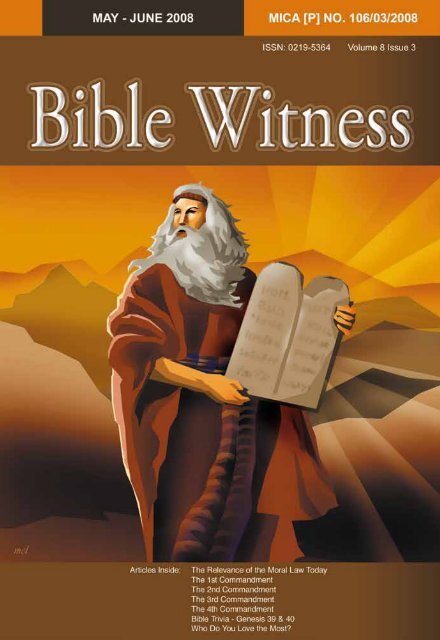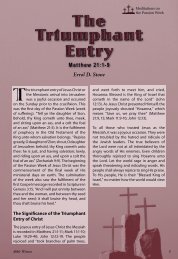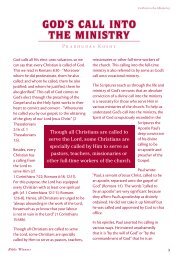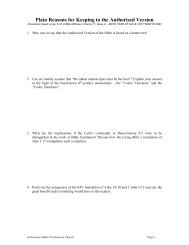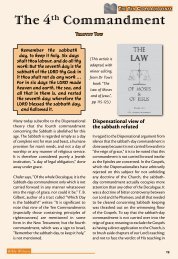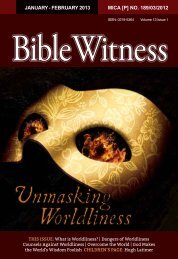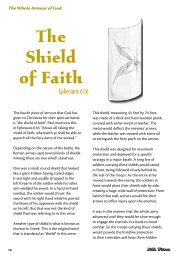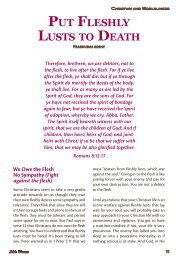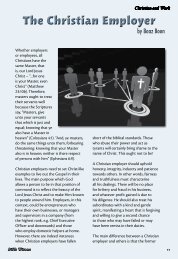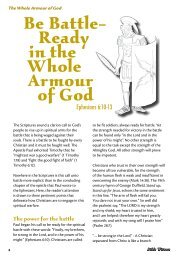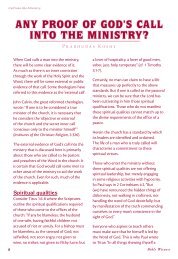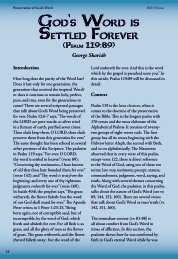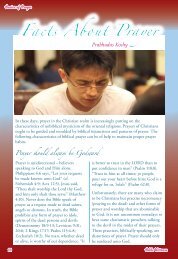The Ten Commandments - Bible Witness
The Ten Commandments - Bible Witness
The Ten Commandments - Bible Witness
You also want an ePaper? Increase the reach of your titles
YUMPU automatically turns print PDFs into web optimized ePapers that Google loves.
<strong>The</strong> Te n Com m a n dments<br />
Contents<br />
<strong>The</strong> <strong>Ten</strong> <strong>Commandments</strong><br />
3 <strong>The</strong> Relevance of<br />
the Moral Law Today<br />
Editor<br />
Prabhudas Koshy<br />
Publishing & Circulation<br />
Co-ordinator<br />
Lok Kwok Wah<br />
Technical Editors<br />
Adrienne Foo, Carolyn Koshy, Jenny Lok,<br />
Lok Kwok Wah, Ruth Low & Mah Lean Choo<br />
Cover Design<br />
Melissa Neo<br />
Layout<br />
Kenneth Wong<br />
Illustrations<br />
Sharon Ng<br />
Publisher<br />
<strong>Bible</strong> <strong>Witness</strong> Media Ministry of<br />
Gethsemane <strong>Bible</strong>-Presbyterian Church,<br />
Singapore<br />
Printer<br />
Chung Printing<br />
Contact Information<br />
By mail:<br />
<strong>Bible</strong> <strong>Witness</strong> Media Ministry<br />
510 Geylang Road, #02-06<br />
Singapore 389466<br />
Tel: (65) 6741-1910 Fax: (65) 6741-1016<br />
Web-site: www.biblewitness.com<br />
E-mail: editor@biblewitness.com<br />
8 <strong>The</strong> 1 st Commandment<br />
10 <strong>The</strong> 2 nd Commandment<br />
13 <strong>The</strong> 3 rd Commandment<br />
19 <strong>The</strong> 4 th Commandment<br />
Children’s Page<br />
25 <strong>Bible</strong> Trivia - Genesis 39 & 40<br />
26 Who Do You Love the Most<br />
SUBSCRIPTION INFORMATION<br />
<strong>The</strong> magazine is distributed free from 2006 onwards. “Freely ye have received, freely give” (Matthew 10:8).<br />
Postage and handling charges for 2 years (12 issues)<br />
SURFACE MAIL<br />
Singapore/Malaysia Other Countries<br />
S$10.00<br />
S$14.00<br />
2<br />
AIR MAIL<br />
Asia<br />
S$26.00<br />
Other Countries<br />
S$34.00<br />
International bank draft, money order or postal order drawn on a Singapore bank in Singapore dollars may be made<br />
payable to “<strong>Bible</strong> <strong>Witness</strong>”.<br />
LOVE-GIFT<br />
<strong>Bible</strong> <strong>Witness</strong> Media Ministry welcomes love-gifts from readers to meet the cost of publishing and distribution. <strong>The</strong> Ministry<br />
also sends the magazine freely to churches in poorer countries. Hence your generous support is much needed and greatly<br />
appreciated.<br />
USE OF ARTICLES<br />
<strong>The</strong> articles may be freely used for non-commercial purposes, so long as they are quoted verbatim, and the writer as well as<br />
the source identified.<br />
<strong>Bible</strong> <strong>Witness</strong>
<strong>The</strong> Te n Com m a n dments<br />
<strong>The</strong> Relevance of<br />
the Moral Law Today<br />
Prabhudas Koshy<br />
We are not left to debate or doubt the relevance<br />
of the moral Law (the <strong>Ten</strong> <strong>Commandments</strong> or<br />
Decalogue) in the daily life of all who trust in<br />
Christ for salvation. We are clearly taught in<br />
the New Testament that faith in Christ does<br />
not nullify the relevance of the Law in the lives<br />
of Christians, but it is required of them to give<br />
the Law the place God always intended it to<br />
have in their lives.<br />
While discussing the Law and justification, the<br />
Apostle Paul wrote in Romans 3:31, “Do we<br />
then make void the law through faith God<br />
forbid: yea, we establish the law.” Though the<br />
Law cannot justify us before God (cf. Romans<br />
3:28), for we are justified by faith in the Gospel<br />
of Jesus Christ, the Law is still very relevant<br />
to our Christian walk. Faith in the Gospel of<br />
Jesus Christ does not nullify the relevance of<br />
the Law.<br />
<strong>The</strong> following teachings of the New Testament<br />
further explain the significance of the <strong>Ten</strong><br />
<strong>Commandments</strong> or the moral Law in a<br />
Christian’s life, even today.<br />
It exposes the sin within us<br />
Romans 3:20 says, “For by the law is the<br />
knowledge of sin.” When we bring our<br />
thoughts, words and actions under the<br />
light of the Law of God, it will show us our<br />
transgressions of His holy Law. <strong>The</strong> Apostle<br />
John teaches us that “whosoever committeth<br />
sin transgresseth also the law: for sin is the<br />
transgression of the law” (1 John 3:4).<br />
Without the Law, man will remain unaware<br />
of his sins. In Romans 7:7, Paul elaborates<br />
this truth even further - “What shall we say<br />
then Is the law sin God forbid. Nay, I had<br />
not known sin, but by the law: for I had not<br />
known lust, except the law had said, Thou<br />
shalt not covet.” <strong>The</strong> Law awakens our souls<br />
to the presence of sin within us. So Paul said<br />
in Romans 7:8, “Without the law sin was<br />
dead.” Likewise, he also said in Romans 4:15,<br />
“where no law is, there is no transgression.” In<br />
other words, without the light of the Law, the<br />
<strong>Bible</strong> <strong>Witness</strong><br />
3
<strong>The</strong> Te n Com m a n dments<br />
ugliness of the stains of sins remains unnoticed<br />
in the darkened souls of men.<br />
If the Law of God is not preached and applied<br />
in the lives of the people, sins will abound<br />
even in Christian congregations. Antinomian<br />
tendencies will take deep root in individuals,<br />
families and communities. Where the Law<br />
of God is not preached, there will be no<br />
conviction of sins and no crying out, “Who<br />
shall save me from this life of sin”<br />
It convicts man of his<br />
condemned state before God<br />
Romans 3:19 says, “Now we know that what<br />
things soever the law saith, it saith to them<br />
who are under the law: that every mouth may<br />
be stopped, and all the world may become<br />
guilty before God.”<br />
<strong>The</strong> ministry of the<br />
Law is to stop<br />
anyone who<br />
dares to speak<br />
of himself as<br />
righteous by<br />
holding him<br />
guilty before the<br />
holiness of God.<br />
No one can argue<br />
in his own defence<br />
that he is not under sin<br />
and God’s wrath. As the Law<br />
holds up God’s holy standards,<br />
it also shows that the whole world<br />
is guilty before God.<br />
To the guilty world, it proclaims God’s just<br />
wrath. In Romans 4:15, Paul wrote that “the law<br />
worketh wrath”. <strong>The</strong> same truth is also found<br />
in 1 Corinthians 15:56 – “<strong>The</strong> sting of death<br />
is sin; and the strength of sin is the law.” <strong>The</strong><br />
righteous Law of God declares to every man<br />
not only his sin, but also his condemnation,<br />
even eternal death. Thus the Law urges sinners<br />
to run to the Saviour for eternal life.<br />
It functions as a schoolmaster<br />
to bring us unto Christ<br />
<strong>The</strong> moral Law not only convicts sinners<br />
of their sins and warns about their eternal<br />
condemnation, but also points them to Christ,<br />
the Saviour. Galatians 3:24 declares, “Wherefore<br />
the law was our schoolmaster to bring us unto<br />
Christ, that we might be justified by faith.”<br />
<strong>The</strong> Law never distracts us from Christ, but<br />
it only leads us to Him. “For Christ is the end<br />
of the law for righteousness to every one that<br />
believeth” (Romans 10:4).<br />
<strong>The</strong> Law clearly tells every man that he<br />
cannot be justified through the<br />
Law. While talking about<br />
our justification<br />
before God, the<br />
Apostle Paul<br />
said, “Knowing<br />
that a man is<br />
not justified by<br />
the works of<br />
the law, but by<br />
the faith of Jesus<br />
Christ, even we have<br />
believed in Jesus Christ,<br />
that we might be justified<br />
by the faith of Christ, and not<br />
by the works of the law: for by<br />
the works of the law shall no flesh<br />
be justified” (Galatians 2:16). Paul then<br />
continued, “For I through the law am dead to<br />
the law, that I might live unto God” (Galatians<br />
2:19). In other words, when a man seeks to<br />
be justified through the Law, he finds himself<br />
under death, being condemned by the Law<br />
for his many transgressions. He is then led to<br />
believe on Christ that he might live unto God.<br />
4<br />
<strong>Bible</strong> <strong>Witness</strong>
<strong>The</strong> Te n Com m a n dments<br />
<strong>The</strong> Law points mankind to Christ, because He<br />
alone fulfilled all the righteousness of the Law<br />
(cf. Matthew 5:17), that we might be imputed<br />
with His righteousness. Moreover, Christ also<br />
bore the curse of the Law for our sin and died<br />
on the cross. “Christ hath redeemed us from<br />
the curse of the law, being made a curse for<br />
us: for it is written, Cursed is every one that<br />
hangeth on a tree” (Galatians 3:13).<br />
Jesus did not come to this world separated<br />
from the Law, but fully in submission to all its<br />
requirements that He might fulfil not only all<br />
its righteousness on our behalf but also to take<br />
away its curse that was upon us. Paul wrote,<br />
“But when the fulness of the time was come,<br />
God sent forth his Son, made of a woman,<br />
made under the law, to redeem them that<br />
were under the law, that we might receive the<br />
adoption of sons” (Galatians 4:4-5). In Romans<br />
8, Paul wrote, “For<br />
what the law<br />
could not do,<br />
in that it<br />
was weak<br />
through<br />
the flesh,<br />
G o d<br />
sending<br />
his own<br />
Son in the<br />
likeness of<br />
sinful flesh,<br />
and for sin,<br />
condemned sin<br />
in the flesh: That the<br />
righteousness of the law<br />
might be fulfilled in us, who<br />
walk not after the flesh, but after<br />
the Spirit” (vv. 3-4). <strong>The</strong>refore, we can<br />
most assuredly say that the Law does not<br />
divert us from Christ, neither Christ from the<br />
Law, for Christ has affirmed and fulfilled the<br />
righteousness of the Law.<br />
It helps to confirm our love<br />
for God and fellow men<br />
Both in the Old Testament and in the New<br />
Testament, obedience of His commandments<br />
proved a person’s love for God (cf. Exodus 20:6;<br />
Deuteronomy 10:12,13; Daniel 9:4; John 14:15;<br />
15:10,14; 2 John 6). Jesus says to His followers,<br />
“If ye love me, keep my commandments” (John<br />
14:15).<br />
It must be emphasised here that Jesus’<br />
commandments did not exclude the <strong>Ten</strong><br />
<strong>Commandments</strong>, for He said that He did not<br />
come to destroy but to fulfil it (cf. Matthew<br />
5:17). <strong>The</strong> Lord Jesus Christ has taught us<br />
more than just the <strong>Ten</strong> <strong>Commandments</strong>,<br />
but not once did He refute or set it aside.<br />
Neither did Jesus teach His followers that it<br />
is alright to ignore or disobey the Decalogue.<br />
Instead, He taught them<br />
how to obey the <strong>Ten</strong><br />
<strong>Commandments</strong><br />
– by loving God<br />
with all their<br />
hearts and<br />
strength and<br />
by loving their<br />
neighbours as<br />
themselves.<br />
In Matthew<br />
22:36-37, Jesus<br />
firmly asserted the<br />
importance of the Law<br />
when He was asked, “Master,<br />
which is the great commandment<br />
in the law” His answer was not that<br />
the Law will be irrelevant from now<br />
onwards, but that “Thou shalt love the Lord<br />
thy God with all thy heart, and with all thy<br />
soul, and with all thy mind. This is the first<br />
and great commandment. And the second is<br />
like unto it, Thou shalt love thy neighbour as<br />
<strong>Bible</strong> <strong>Witness</strong><br />
5
<strong>The</strong> Te n Com m a n dments<br />
thyself. On these two commandments hang all<br />
the law and the prophets.” Thus Jesus taught<br />
us that we can fulfil the moral Law by loving<br />
God and loving our neighbour.<br />
Now ask yourself in the light of the above<br />
teaching of Christ whether a man can justly<br />
claim that he truly loves God and his fellow<br />
brethren when he refuses to obey even one of<br />
the <strong>Ten</strong> <strong>Commandments</strong>.<br />
<strong>The</strong> Apostle John reminds us, “For this is the<br />
love of God, that we keep his commandments:<br />
and his commandments are not grievous” (1<br />
John 5:3). <strong>The</strong> Apostle Paul said in Galatians<br />
5:14, “For all the law is fulfilled in one word,<br />
even in this; Thou shalt love thy neighbour<br />
as thyself.” In Romans 13, he wrote, “Owe no<br />
man any thing, but to love one another: for he<br />
that loveth another hath fulfilled the law. For<br />
this, Thou shalt not commit adultery, Thou<br />
shalt not kill, Thou shalt not steal, Thou shalt<br />
not bear false witness, Thou shalt not covet;<br />
and if there be any other commandment, it is<br />
briefly comprehended in this saying, namely,<br />
Thou shalt love thy neighbour as thyself. Love<br />
worketh no ill to his neighbour: therefore love<br />
is the fulfilling of the law” (vv. 8-9).<br />
Christ and the apostles clearly upheld the<br />
Decalogue as an expression of love for God<br />
and man. Hence, the commandments of God<br />
are a guide to us by which our love for God<br />
is given rich expression. <strong>The</strong>y do not grant<br />
us salvation, but they provide those who are<br />
already saved by faith in Christ the proper<br />
expression of a life that is filled with love for<br />
God and fellow men.<br />
<strong>The</strong> Law of God is not antithetical to the love of<br />
God. God’s Law and His love are not opposing<br />
or conflicting spiritual realities. Instead, there<br />
is an immutable and unbreakable bond<br />
between them. <strong>The</strong> Law and love are two<br />
spiritual realities that God has joined, which<br />
no man should put asunder. True love does<br />
not promote lawlessness, but it promotes<br />
the fulfilling of His Laws. James, in his epistle,<br />
explains this truth. “If ye fulfil the royal law<br />
according to the scripture, Thou shalt love<br />
thy neighbour as thyself, ye do well: But if ye<br />
have respect to persons, ye commit sin, and<br />
are convinced of the law as transgressors. For<br />
whosoever shall keep the whole law, and yet<br />
offend in one point, he is guilty of all. For he<br />
that said, Do not commit adultery, said also,<br />
Do not kill. Now if thou commit no adultery,<br />
yet if thou kill, thou art become a transgressor<br />
of the law. So speak ye, and so do, as they that<br />
shall be judged by the law of liberty” (James<br />
2:8-12).<br />
It shows us the path of<br />
righteousness and guides us in it<br />
<strong>The</strong> Apostle Paul says, “Wherefore the law is<br />
holy, and the commandment holy, and just,<br />
and good” (Romans 7:12). Again Paul asserts,<br />
“For we know that the law is spiritual” (Romans<br />
7:14). Every one of the <strong>Ten</strong> <strong>Commandments</strong> is<br />
holy, just like its Giver, the Lord Himself. God<br />
gave them to command and to encourage<br />
holiness in His people.<br />
<strong>The</strong> Decalogue is the holy will of God. It is<br />
spiritual, for it forbids spiritual wickedness,<br />
such as heart-murder and heart-adultery, and<br />
it commands spiritual service. It requires the<br />
heart to render worship to God with total<br />
devotion. It is God’s spiritual Law for all His<br />
people.<br />
In Romans 7 and 8, Paul showed the importance<br />
of the Law in fighting off the onslaught of the<br />
flesh. In Romans 8:7, he mentioned that “the<br />
carnal mind is enmity against God: for it is<br />
not subject to the law of God”. In fact, he had<br />
already explained in Romans 7 that the sinful<br />
6<br />
<strong>Bible</strong> <strong>Witness</strong>
<strong>The</strong> Te n Com m a n dments<br />
or fleshly nature within him is overcome by his<br />
inward commitment to the Law of God. He<br />
said, “For I delight in the law of God after the<br />
inward man” (Romans 7:22). He also “thank<br />
God through Jesus Christ our Lord” in Romans<br />
7:25, saying that “with the mind I myself serve<br />
the law of God” as he faced the temptation<br />
of the flesh to serve the Law of sin. If the<br />
Law of God had been Paul’s help in the fight<br />
against the flesh, we should also adhere to the<br />
Law with the help of the Holy Spirit to fight<br />
against the fleshly desires of our body. “That<br />
the righteousness of the law might be fulfilled<br />
in us, who walk not after the flesh, but after<br />
the Spirit” (Romans 8:4).<br />
<strong>The</strong> moral Law, under the<br />
guidance of the Holy Spirit, gives<br />
evidence to our conscience<br />
the actual nature of our<br />
sanctification. When the<br />
Spirit helps us to compare<br />
our thoughts and actions<br />
with the Law, we will be<br />
able to discern whether<br />
we are growing towards<br />
the perfection that God<br />
requires in our practical living. Thus the<br />
Law, as a standard of holiness set by<br />
God, functions, in the hand of the Holy<br />
Spirit, as a guide to us in our pursuit of<br />
holiness.<br />
Conclusion<br />
<strong>The</strong> Law of God is relevant and important<br />
to Christians. In fact, Hebrews 8:10 says<br />
concerning the people of the new covenant<br />
that the Law is written in their hearts, “For this<br />
is the covenant that I will make with the house<br />
of Israel after those days, saith the Lord; I will<br />
put my laws into their mind, and write them<br />
in their hearts: and I will be to them a God,<br />
and they shall be to me a people” (cf. Jeremiah<br />
31:31). Though the new covenant is specifically<br />
focused on Israel (in Jeremiah 31:31), it is clear<br />
that Christians of the present time also stand<br />
under its blessings (cf. Romans 11:13-27).<br />
This perception does not lead to confusion<br />
between Israel and the Church. So under the<br />
new covenant, all believers are promised that<br />
God will write His Laws in their hearts and<br />
minds. For all who know Jesus Christ as their<br />
Saviour and Lord and have become partakers<br />
in the new covenant, the Law is an internal<br />
truth, written in their hearts, more than just<br />
external, written on two stone tablets and<br />
placed in the Ark of the Covenant.<br />
Matthew Henry rightly said, “<strong>The</strong><br />
Law is still of use to convince us<br />
of what is past, and to direct<br />
us for the future; though we<br />
cannot be saved by it as a<br />
covenant, yet we own it,<br />
and submit to it, as a rule in<br />
the hand of the Mediator,<br />
subordinate to the Law of<br />
grace; and so, are so far<br />
from overthrowing that<br />
we establish the Law. Let<br />
those who deny the obligation of the moral<br />
Law on believers consider this.”<br />
Finally, let us consider Jesus’ words,<br />
“Whosoever therefore shall break one of<br />
these least commandments, and shall teach<br />
men so, he shall<br />
be called the least<br />
in the kingdom<br />
of heaven: but<br />
whosoever shall do<br />
and teach them,<br />
the same shall<br />
be called great in<br />
the kingdom of<br />
heaven” (Matthew<br />
5:19). •<br />
<strong>Bible</strong> <strong>Witness</strong><br />
7
<strong>The</strong> Te n Com m a n dments<br />
<strong>The</strong> 1 st Commandment<br />
Prabhudas Koshy<br />
Thou shalt have no<br />
other gods before me.<br />
<strong>The</strong> first commandment states, “Thou shalt<br />
have no other gods before me” (Exodus<br />
20:3). It was spoken by the Lord God of<br />
Israel, immediately after He declared, “I<br />
am the LORD thy God, which have brought<br />
thee out of the land of Egypt, out of the<br />
house of bondage” (Exodus 20:2). <strong>The</strong> Lord<br />
God Almighty, the Creator of the world,<br />
who has delivered Israel out of Egypt to<br />
bring them to the land He promised to<br />
Abraham and His descendents, requires<br />
from His people undivided allegiance.<br />
Jesus Christ reiterated this commandment<br />
when He answered the question, “Which<br />
is the first commandment of all” (Mark<br />
12:28). He said, “<strong>The</strong> first of all the<br />
commandments is, Hear, O Israel; <strong>The</strong> Lord<br />
our God is one Lord: And thou shalt love<br />
the Lord thy God with all thy heart, and<br />
with all thy soul, and with all thy mind,<br />
and with all thy strength: this is the first<br />
commandment” (Mark 12:29-30). This is<br />
our Lord’s exposition of the first of the <strong>Ten</strong><br />
<strong>Commandments</strong>.<br />
When God commanded that “Thou shalt<br />
have no other gods before me”, it was a call<br />
to steadfast love, faith, devotion, obedience<br />
and service to Him. It was a declaration to<br />
His people that they should not give to<br />
anything or anyone, either in heaven or<br />
earth, their heart-worship of affiance, love,<br />
fear, veneration and dependence.<br />
This command, with respect to worship,<br />
firstly, teaches us that we must have a<br />
God, which, of course, ought to be the<br />
Lord Jehovah and none else. <strong>The</strong> Apostle<br />
Paul tells us that those “things which the<br />
Gentiles sacrifice, they sacrifice to devils,<br />
and not to God: and I would not that ye<br />
should have fellowship with devils” (1<br />
Corinthians 10:20). Thus to join any other<br />
thing with the Lord God as the object of<br />
our worship is to debase and disparage<br />
Him. <strong>The</strong>refore, in Zephaniah 1:5-6, God<br />
severely threatened to cut off and to<br />
destroy those “that worship the host of<br />
heaven upon the housetops; and them that<br />
worship and that swear by the LORD, and<br />
that swear by Malcham; and them that are<br />
turned back from the LORD; and those that<br />
have not sought the LORD, nor required<br />
for him.” Hence, a proper application of<br />
the first commandment forbids us from<br />
adhering to atheism, polytheism, idolatry,<br />
ecumenism, etc.<br />
Secondly, it requires that all our acts of<br />
worship and services to God are to be<br />
performed with sincerity and true devotion.<br />
This is implied in the expression “before me”<br />
- “Thou shalt have no other gods before<br />
me.” Before Him, we are all naked and bare;<br />
nothing is hidden from Him. So if we come<br />
before Him with a form of religiosity that<br />
tries to conceal hearts that are corrupt and<br />
rebellious, He will utterly reject us. In His<br />
sight, we must appear wholly pure and also<br />
8<br />
<strong>Bible</strong> <strong>Witness</strong>
<strong>The</strong> Te n Com m a n dments<br />
fully devoted to Him. It is not enough to<br />
have no other gods, or not to prostrate<br />
before any visible idol set up in a temple.<br />
<strong>The</strong> Law, which is spiritual, will search<br />
the very thoughts and inclinations of<br />
our souls. If secret lusts or hidden sins,<br />
which are the soul’s idols, are found in<br />
the dark corners of our souls, we would<br />
be guilty of breaking His commandment.<br />
It is abominable to appear before God to<br />
worship Him with corrupt and sinister<br />
ambitions and motives; this is to have<br />
another god in the sight of God, though<br />
hidden to human eyes. Let us also take<br />
note that when we perform duties of<br />
religion only to be seen and applauded<br />
by men, we are disregarding or even<br />
dispelling God from our religiousness.<br />
This is yet another form of idolatry,<br />
where fellow men are esteemed above<br />
God.<br />
Finally, I would like to urge my readers to<br />
consider the following exposition of the<br />
first commandment by the Westminster<br />
Larger Catechism in question and answer<br />
format (Question 104):<br />
What are the duties required in the first<br />
commandment<br />
<strong>The</strong> duties required in the first<br />
commandment are, the knowing and<br />
acknowledging of God to be the only<br />
true God, and our God; and to worship<br />
and glorify him accordingly, by thinking,<br />
meditating, remembering, highly<br />
esteeming, honouring, adoring, choosing,<br />
loving, desiring, fearing of him; believing<br />
him; trusting, hoping, delighting, rejoicing<br />
in him; being zealous for him; calling upon<br />
him, giving all praise and thanks, and<br />
yielding all obedience and submission to<br />
him with the whole man; being careful in all<br />
things to please him, and sorrowful when<br />
in anything he is offended; and walking<br />
humbly with him.<br />
•<br />
<strong>The</strong> law discovers the disease.<br />
<strong>The</strong> gospel gives the remedy.<br />
– Martin Luther –<br />
<strong>The</strong> gospel does not<br />
abrogate God’s law,<br />
but it makes men love it<br />
with all their hearts.<br />
– J Gresham Machen –<br />
<strong>Bible</strong> <strong>Witness</strong><br />
9
<strong>The</strong> Te n Com m a n dments<br />
<strong>The</strong> 2 nd Commandment<br />
Hien Nguyen<br />
Thou shalt not make unto<br />
thee any graven image, or<br />
any likeness of any thing that<br />
is in heaven above, or that is in<br />
the earth beneath, or that is in<br />
the water under the earth: Thou<br />
shalt not bow down thyself to<br />
them, nor serve them …<br />
Man’s concept of worship<br />
When God created the heaven and the earth,<br />
and all things in them, He created them by<br />
His Word; but when creating human beings,<br />
“God created man in his own image” and<br />
“formed man of the dust of the ground, and<br />
breathed into his nostrils the breath of life;<br />
and man became a living soul” (Genesis 1:27;<br />
2:7). Man was created with an immortal soul,<br />
having a will, conscience, power of reason<br />
and intelligence that he might be capable<br />
of rendering worship to God. Nonetheless,<br />
due to sin, his notion of worship became<br />
corrupt. Romans 1:21-25 says, “. . .when they<br />
knew God, they glorified him not as God,<br />
neither were thankful; but became vain in<br />
their imaginations, and their foolish heart<br />
was darkened. Professing themselves to<br />
be wise, they became fools, and changed<br />
the glory of the uncorruptible God into an<br />
image made like to corruptible man, and to<br />
birds, and fourfooted beasts, and creeping<br />
things. Wherefore God also gave them up to<br />
uncleanness . . . Who changed the truth of<br />
God into a lie, and worshipped and served<br />
the creature more than the Creator, who is<br />
blessed for ever. Amen.”<br />
God’s commandment<br />
on worship<br />
In order to prevent man from totally falling<br />
into folly and false worship, God gave His Law;<br />
and He commanded firstly that “Thou shalt<br />
have no other gods before me”, and secondly<br />
that “Thou shalt not make unto thee any<br />
graven image, or any likeness of any thing<br />
that is in heaven above, or that is in the earth<br />
beneath, or that is in the water under the<br />
earth” (Exodus 20:3-4; cf. Deuteronomy 5:7-8).<br />
<strong>The</strong> second commandment strengthens the<br />
first.<br />
Let us consider the implications of the second<br />
commandment:<br />
1. “Thou shalt not make unto thee any<br />
graven image, or any likeness of any thing<br />
that is in heaven above, or that is in the earth<br />
beneath, or that is in the water under the<br />
earth.” Do we keep or embrace “idols” visibly<br />
or within our hearts<br />
2. “Thou shalt not bow down thyself to<br />
them, nor serve them.” Do we love, obey or<br />
bow down to anyone or anything other than<br />
God It is idolatry!<br />
3. “For I the LORD thy God am a<br />
jealous God, visiting the iniquity of the<br />
fathers upon the children unto the third<br />
and fourth generation of them that hate<br />
me; and shewing mercy unto thousands of<br />
10<br />
<strong>Bible</strong> <strong>Witness</strong>
<strong>The</strong> Te n Com m a n dments<br />
them that love me, and keep my<br />
commandments.” God is “the<br />
LORD”, the covenant God of<br />
His people; the self-existing, selfsufficient,<br />
eternal, immutable,<br />
mighty and faithful God, who<br />
always keeps His words, which<br />
are covenants and promises to<br />
His people. God is “a jealous God”,<br />
who demands our exclusive love,<br />
obedience, worship and service.<br />
God will bless those who love<br />
Him and punish those who hate<br />
Him, reject Him or depart from<br />
Him. On the Judgment Day, the<br />
idolaters will be condemned “in<br />
the lake which burneth with<br />
fire and brimstone: which is the<br />
second death” (Revelation 21:8).<br />
Idols and idolatry<br />
An idol is an object, an image<br />
or a natural representation that<br />
people adore and worship as<br />
“God”. <strong>The</strong> worship of idols is<br />
idolatry, and those who practise idolatry<br />
are idolaters. <strong>The</strong> Scripture says, “For all the<br />
gods of the people are idols: but the LORD<br />
made the heavens” (1 Chronicles 16:26; cf.<br />
Psalm 96:5). <strong>The</strong> God of the Scripture is the<br />
only living and true God, and all other “gods”<br />
or “idols” are nothing (1 Corinthians 8:4-6; 1<br />
<strong>The</strong>ssalonians 1:9).<br />
Sin separates man from God and His truth, His<br />
light and His life. Satan has taken advantage of<br />
man’s predisposition towards the worship of<br />
God, and has been deceiving and misleading<br />
him into worshipping all kinds of false gods or<br />
idols, even to worship Satan himself unaware.<br />
<strong>The</strong> Apostle Paul says, “… the things which the<br />
Gentiles sacrifice, they sacrifice to devils, and<br />
not to God: and I would not that ye should<br />
have fellowship with devils” (1 Corinthians<br />
10:20). Spiritual deception is the reason why<br />
there are so many religions or religious groups,<br />
and even occult groups. We can see that the<br />
world, nowadays, is full of idolatry, not only in<br />
man-made religions with statues, images and<br />
pictures but also in the hearts of men. Idols<br />
in the heart include loved ones, self-image,<br />
name, fame, titles, popularity, high positions,<br />
wealth, worldly entertainment or pleasures, a<br />
movie star or a sports star, etc.<br />
Failure to love God and obey God’s Word<br />
is idolatry. We are commanded to love the<br />
Lord our God with all our heart, with all<br />
our soul, with all our mind and with all our<br />
strength, and loving God means obeying Him<br />
and keeping His words (cf. Mark 12:30; John<br />
<strong>Bible</strong> <strong>Witness</strong><br />
11
<strong>The</strong> Te n Com m a n dments<br />
14:23). When we disobey or partly obey God’s<br />
Word, it is idolatry as we love our own will<br />
more than God’s will. King Saul was rebuked,<br />
“Behold, to obey is better than sacrifice, and<br />
to hearken than the fat of rams. For rebellion<br />
is as the sin of witchcraft, and stubbornness<br />
is as iniquity and idolatry. Because thou hast<br />
rejected the word of the LORD, he hath also<br />
rejected thee from being king” (1 Samuel<br />
15:22-23). God has magnified His Word above<br />
all His name (cf. Psalm 138:2), so if we do not<br />
submit to God’s Word, we do not submit to<br />
Him. If we doubt or reject God’s Word, we<br />
are in fact doubting or rejecting Him. If we<br />
think there is something wrong with God’s<br />
Word, we actually think there is something<br />
wrong with God Himself! We should keep<br />
ourselves from idolatry by not bowing down<br />
and obeying man’s words, ideas or arguments.<br />
God confirms that He has perfectly inspired<br />
and perfectly preserved His Word (cf. Psalm<br />
12:6-7; Matthew 5:18; 24:35; 2 Timothy 3:16,<br />
et al.) so that we may keep and obey God’s<br />
Word in faith with all our heart, as well as in<br />
complete reverence and submission. Satan<br />
has cast doubt on God’s Word, and many are<br />
deceived; doubting and questioning God’s<br />
Word! Non-submission to God’s Word is<br />
rebellion and idolatry!<br />
Failure to exalt God’s name alone is<br />
idolatry. When we have secret motives or<br />
desires to promote ourselves, it is idolatry!<br />
Our Lord Jesus rebuked the Jewish leaders<br />
severely for their selfish motives and hypocrisy<br />
(cf. Matthew 23). <strong>The</strong> proper attitude is, “He<br />
(the Lord Jesus) must increase, but I must<br />
decrease” (John 3:30). If we are controlled by<br />
the Holy Spirit, we shall glorify the Lord Jesus<br />
Christ alone (cf. John 16:14). Many claim to be<br />
filled with the Holy Spirit but still desire to<br />
promote themselves! <strong>The</strong>ir name and fame<br />
become an idol to them!<br />
Failure to learn to be content in the Lord<br />
is idolatry. <strong>The</strong> Scripture speaks about<br />
“covetousness, which is idolatry” (Colossians<br />
3:5) and the “covetous man, who is an idolater”<br />
(Ephesians 5:5). Here, an idolater is a person<br />
who wants more and more, who wants<br />
something that others have and greedy for<br />
wrongful gain. When a person is so greedy for<br />
fame, power, position, money or anything in<br />
this world, his heart and mind are preoccupied<br />
with those things and there is no room for<br />
the Lord and His Word! This is idolatry! Paul<br />
says, “For I have learned, in whatsoever state<br />
I am, therewith to be content” (Philippians<br />
4:11) as “godliness with contentment is great<br />
gain” (1 Timothy 6:6). Are you and I learning<br />
to be content in the Lord and choosing Him<br />
as our portion<br />
Conclusion<br />
“God is a Spirit”, and He wants you and me to<br />
“worship him in spirit and in truth” (John 4:23-<br />
24). God hates idolatry as it is an abomination<br />
to Him (cf. Deuteronomy 7:25; 16:22). So we<br />
ought to turn “to God from idols to serve the<br />
living and true God” (1 <strong>The</strong>ssalonians 1:9).<br />
May He graciously search and cleanse our<br />
hearts from all our sins, including idolatry.<br />
May His love constrain us to love Him, keep<br />
His Word, serve Him and exalt Him above all.<br />
May the Lord find<br />
us content in Him,<br />
submissive to<br />
Him and faithful<br />
to Him until the<br />
end. May He help<br />
us to know Him<br />
more, fear Him<br />
and always keep<br />
ourselves from<br />
idols (1 John 5:21).<br />
Amen. •<br />
12<br />
<strong>Bible</strong> <strong>Witness</strong>
<strong>The</strong> Te n Com m a n dments<br />
<strong>The</strong> 3 rd Commandment<br />
Dennis Kabingue<br />
Thou shalt not take the name<br />
of the LORD thy God in vain;<br />
for the LORD will not hold him<br />
guiltless that taketh his name in<br />
vain.<br />
Introduction<br />
<strong>The</strong>re is no need to survey which name is most<br />
mocked at by the world. <strong>The</strong> answer is obvious<br />
– the “name of the LORD”!<br />
People from different walks of life and religious<br />
convictions are guilty of breaking the third<br />
commandment. <strong>The</strong> “name of the LORD”<br />
has been an empty expression in the mouths<br />
of many. Is it not true that when people are<br />
disappointed, embarrassed, surprised, or<br />
arguing, they would often utter words like<br />
“(Oh) my gosh!”, “(Oh) my goodness”, “(Oh)<br />
my god”, “Jesus!” or “for Christ’s sake”<br />
Even those who claim to be Christians are also<br />
prone to use God’s name in vain. Many of us<br />
are guilty of using “the name of the LORD” to<br />
hide our hypocrisy. Our mouths are quick to<br />
render glory to God while our hearts are still<br />
robbing God of His glory through their sinful<br />
inclinations. How many times we pronounce,<br />
“Thank God”, “Praise the Lord” or “God bless”<br />
in insincerity!<br />
Dear reader, are you not also guilty of breaking<br />
the third commandment Take note, as far as<br />
God is concerned, He will hold accountable<br />
all who break this commandment. If you<br />
want to avoid breaking it, it is time that you<br />
seriously meditate on this commandment<br />
and submit to its admonitions. In this article,<br />
we will study: (1) the purpose of the third<br />
commandment, (2) the prohibition of the<br />
third commandment, and (3) the penalty of<br />
the third commandment.<br />
<strong>The</strong> purpose of the third<br />
commandment<br />
<strong>The</strong> prohibitive language of the third<br />
commandment sets its purpose. It is written<br />
to communicate God’s expectation of His<br />
people. He requires 100 per cent reverence<br />
and confidence in His name. God wants His<br />
children to worship His name in their hearts<br />
all the time. <strong>The</strong>re is not a single moment<br />
allocated to abate the glory and honour of<br />
“the name of the LORD”. <strong>The</strong> <strong>Bible</strong> calls us<br />
to “Give unto the LORD the glory due unto<br />
his name; worship the LORD in the beauty of<br />
holiness” (Psalm 29:2).<br />
In these days, many tend to have the attitude<br />
that it is alright to make fun of someone<br />
else’s name. This mentality has contributed<br />
to the diluting of the severity of the third<br />
commandment. It would be helpful to note<br />
the biblical concept of a name. In biblical<br />
times, a name suggests the existence,<br />
character, reputation and sphere of influence<br />
of a person. So if we apply this understanding<br />
to God, that is, when we talk of His name,<br />
we are actually talking about His existence as<br />
God, His character as God, His reputation as<br />
(Continued on page 17)<br />
<strong>Bible</strong> <strong>Witness</strong><br />
13
<strong>The</strong> Te n Com m a n dments<br />
Charles Spurgeon<br />
on the Law of God<br />
<strong>The</strong> Law is the stormy wind<br />
which drives souls into the harbour<br />
of refuge. <strong>The</strong> Law is the sheriff’s<br />
officer to shut men up in prison<br />
for their sin, concluding them<br />
all under condemnation in<br />
order that they may look to the<br />
free Grace of God, alone, for<br />
deliverance! This is the object of the<br />
Law—it empties, that Grace may fill—and<br />
wounds that Mercy may heal. It has never been God’s intention<br />
towards us, as fallen men, that the Law should be regarded as<br />
a way to salvation for us, for a way of salvation it can never be.<br />
Had man never fallen. Had his nature remained as God made<br />
it, the Law would have been most helpful to him to show him<br />
the way in which he should walk. And by keeping it he would<br />
have lived, for, “he that does these things shall live in them.”<br />
But ever since man has fallen, the Lord has not proposed to<br />
him a way of salvation by works, for He knows it to be impossible<br />
to a sinful creature. <strong>The</strong> Law is already broken and whatever<br />
man can do, he cannot repair the damage he has already done.<br />
<strong>The</strong>refore he is out of court as to the hope of merit. <strong>The</strong> Law<br />
demands perfection, but man has already fallen short of it and,<br />
therefore, let him do his best, he cannot accomplish what is<br />
absolutely essential. <strong>The</strong> Law is meant to lead the sinner to faith<br />
in Christ by showing the impossibility of any other way! It is the<br />
black dog to fetch the sheep to the shepherd. It is the burning<br />
heat which drives the traveller to the shadow of the great rock<br />
in a weary land.<br />
16<br />
<strong>Bible</strong> <strong>Witness</strong>
(Continued from page 13)<br />
God and His sphere of influence as God! So<br />
when people make fun of the name of the<br />
LORD, they are making fun of His existence,<br />
His character, His reputation and His influence.<br />
In other words, they are mocking God right<br />
at His face!<br />
Do you now see how grievous it is to break<br />
the third commandment If you are guilty of<br />
taking the name of the Lord in vain, repent<br />
and warn your friends who likewise take His<br />
<strong>The</strong> Te n Com m a n dments<br />
you, and I will curse your blessings: yea, I have<br />
cursed them already, because ye do not lay it<br />
to heart” (Malachi 2:2).<br />
Solomon, under the inspiration of the Holy<br />
Spirit, rallies God’s people to secure a good<br />
name. In the book of Proverbs, he wrote, “A<br />
good name is rather to be chosen than great<br />
riches, and loving favour rather than silver and<br />
gold” (Proverbs 22:1). In Ecclesiastes 7:1, he<br />
wrote, “A good name is better than precious<br />
ointment; and the day of death<br />
than the day of one’s birth.” If<br />
God is teaching His people to<br />
do their best to preserve a good<br />
name, this should make you think<br />
how much more God treasures<br />
His own name.<br />
<strong>The</strong> prohibition of the<br />
third commandment<br />
<strong>The</strong> prohibition of the third<br />
commandment is against using<br />
the name of the Lord in vain. At<br />
the outset, it may look simple.<br />
But, it is not so. <strong>The</strong> coverage<br />
of this prohibition is very<br />
broad. Let no one think that<br />
he is only guilty of breaking the<br />
third commandment when he<br />
says, “(Oh) my gosh!”, “(Oh) my<br />
goodness”, “(Oh) my god”, “Jesus!”<br />
or “for Christ’s sake”.<br />
name in vain. Otherwise, you are in danger of<br />
God’s wrath! Listen to the warning of the Lord,<br />
“If ye will not hear, and if ye will not lay it to<br />
heart, to give glory unto my name, saith the<br />
LORD of hosts, I will even send a curse upon<br />
To follow this thought, it is<br />
important to consider the<br />
phrase “the name of the LORD”<br />
and also the meaning of the word<br />
“vain”. <strong>The</strong> word “vain” describes “anything<br />
that is unsubstantial, unreal, worthless, either<br />
materially or morally”. Since “the name of the<br />
LORD” speaks of the person and the work of<br />
God, any “unsubstantial, unreal, worthless”<br />
<strong>Bible</strong> <strong>Witness</strong><br />
17
<strong>The</strong> Te n Com m a n dments<br />
usage or reference either to His person or<br />
His work is a direct violation of the third<br />
commandment.<br />
Question 113 of the Westminster Larger<br />
Catechism indicates that the prohibition of<br />
the third commandment includes the abuse of<br />
the names or titles of God in swearing and evil<br />
talk, the violation of His commandments, the<br />
misapplication of His truths and the adherence<br />
to false doctrines.<br />
We violate this commandment even when<br />
we doubt the promises of God and teach<br />
His Word wrongly. This commandment also<br />
warns those who are teaching in the Sunday<br />
school or those who are called to the pulpit<br />
ministry not to twist and turn God’s Word. We<br />
must preach it faithfully. Otherwise, we are in<br />
danger of God’s wrath (cf. Matthew 5:19-20).<br />
How about the Charismatics and the<br />
Pentecostals who seem to be full of piety<br />
<strong>The</strong>y love to shout out the name of the Lord.<br />
In their worship services, they often proclaim,<br />
“Hallelujah, praise the Lord”, “I love you, Jesus”,<br />
“We magnify your name, O Lord”, etc.<br />
I remember attending a Christmas Cantata<br />
where godly songs of the Advent were mixed<br />
with the songs of the world like “Frosty the<br />
Snow Man” and “Twelve Days of Christmas”. At<br />
the end of the programme, the pastor claimed<br />
that they have exalted God’s name. How could<br />
they claim that the Lord was exalted by the<br />
singing of unbiblical worldly songs This is<br />
very much like those who would say to the<br />
Lord at His coming, “Lord, Lord, have we not<br />
prophesied in thy name and in thy name have<br />
cast out devils and in thy name done many<br />
wonderful works”, but would be rebuked by<br />
Him, “I never knew you: depart from me, ye<br />
that work iniquity” (Matthew 7:22-23).<br />
<strong>The</strong> penalty of the third<br />
commandment<br />
<strong>The</strong> penalty of the third commandment may<br />
not be stated for every situation but one thing<br />
is certain, no guilty party can escape from the<br />
wrath of God. <strong>The</strong> Lord vowed that any guilty<br />
party will not remain guiltless. “Thou shalt not<br />
take the name of the LORD thy God in vain;<br />
for the LORD will not hold him guiltless that<br />
taketh his name in vain’’ (Exodus 20:7).<br />
In the Old Testament economy, those<br />
blaspheming the name of the Lord were<br />
stoned to death. “And he that blasphemeth<br />
the name of the LORD, he shall surely be<br />
put to death, and all the congregation shall<br />
certainly stone him: as well the stranger, as he<br />
that is born in the land, when he blasphemeth<br />
the name of the LORD, shall be put to death”<br />
(Leviticus 24:16).<br />
Conclusion<br />
After reading this article, what is your<br />
assessment of yourself Some would be<br />
moved to lament like the Apostle Paul, “O<br />
wretched man that I am! who shall deliver me<br />
from the body of this death” While the Law of<br />
God condemns our sins, it points us to Christ,<br />
who alone is our hope of salvation! Are you<br />
not thankful for the Law that points you to<br />
Christ and for His<br />
forgiveness when<br />
you repent May<br />
we also trust in<br />
the Spirit of God<br />
for His aid not to<br />
violate the third<br />
commandment<br />
but to magnify His<br />
name more and<br />
more! •<br />
18<br />
<strong>Bible</strong> <strong>Witness</strong>
<strong>The</strong> Te n Com m a n dments<br />
<strong>The</strong> 4 th Commandment<br />
Timothy Tow<br />
Remember the sabbath<br />
day, to keep it holy. Six days<br />
shalt thou labour, and do all thy<br />
work: But the seventh day is the<br />
sabbath of the LORD thy God: in<br />
it thou shalt not do any work …<br />
For in six days the LORD made<br />
heaven and earth, the sea, and<br />
all that in them is, and rested<br />
the seventh day: wherefore the<br />
LORD blessed the sabbath day,<br />
and hallowed it.<br />
Many today subscribe to the Dispensational<br />
theory that the fourth commandment<br />
concerning the Sabbath is abolished for this<br />
age. <strong>The</strong> Sabbath is regarded simply as a day<br />
of complete rest for man and beast, a humane<br />
provision for man’s needs, and not a day of<br />
worship or any manner of religious service.<br />
It is therefore considered purely a Jewish<br />
institution, “a day of legal obligation,” done<br />
away under grace.<br />
Chafer says, “Of the whole Decalogue, it is the<br />
Sabbath-day commandment only which is not<br />
carried forward in any manner whatsoever<br />
into the reign of grace, nor could it be.” T. B.<br />
Gilbert, author of a tract called “Which Day<br />
is the Sabbath” writes: “It is significant to<br />
note that nine of the <strong>Ten</strong> <strong>Commandments</strong><br />
(especially those containing principles of<br />
righteousness) are mentioned in some<br />
form in the New Testament; but the fourth<br />
commandment, which was a sign to Israel,<br />
“Remember the sabbath day, to keep it holy,”<br />
is not mentioned.<br />
(This article is<br />
adapted, with<br />
minor editing,<br />
from Dr Tow’s<br />
book “<strong>The</strong><br />
Law of Moses<br />
and of Jesus”,<br />
pp 115-123.)<br />
Dispensational view of<br />
the sabbath refuted<br />
In regard to the Dispensational argument from<br />
silence that the sabbath-day commandment is<br />
done away because it is not carried forward into<br />
“the reign of grace,” it is to be noted that this<br />
commandment is not carried forward insofar<br />
as the Epistles are concerned. In the Gospels,<br />
which the Dispensationalists have arbitrarily<br />
rejected on this subject for not unfolding<br />
any doctrine of the Church, the sabbathday<br />
commandment actually occupies more<br />
attention than any other of the Decalogue. It<br />
was a doctrine of bitter controversy between<br />
our Lord and the Pharisees, and all that needed<br />
to be cleared concerning Sabbath keeping<br />
was thrashed out on the winnowing floor<br />
of the Gospels. To say that the sabbath-day<br />
commandment is not carried over into the<br />
reign of grace, meaning to exclude the Gospels<br />
as having a direct application to the Church, is<br />
to brush aside chapters of our Lord’s teaching;<br />
and not to face the verdict of His teaching in<br />
<strong>Bible</strong> <strong>Witness</strong><br />
19
<strong>The</strong> Te n Com m a n dments<br />
such a case is to renounce the jurisdiction<br />
of a section of the Word of God. Is not “all<br />
scripture given by inspiration of God” and<br />
“profitable for doctrine” (2 Timothy 3:16).<br />
Since the teaching of Jesus, whether recorded<br />
in the Sermon on the Mount or elsewhere<br />
in the Gospels, binds the Church in doctrine<br />
and practice, the Dispensational argument<br />
from silence must be considered to be<br />
untenable. However, before the verdict of<br />
Jesus is sought, the Pauline “proof texts” on<br />
the Sabbath question<br />
require preliminary<br />
examination.<br />
<strong>The</strong> first passage of<br />
Scripture quoted by<br />
the Dispensationalists<br />
for the abrogation<br />
of the Sabbath is<br />
Colossians 2:16-17:<br />
“Let no man therefore<br />
judge you in meat, or<br />
in drink, or in respect<br />
of an holyday, or of<br />
the new moon, or<br />
of the sabbath days:<br />
Which are a shadow<br />
of things to come;<br />
but the body is of<br />
Christ.”<br />
<strong>The</strong> Gentile Christians<br />
were not only released from keeping Jewish<br />
food laws, except that they should “abstain<br />
from meats offered to idols, and from blood<br />
and from things strangled” (Acts 15:29), but<br />
they were freed also from the rest of the<br />
ceremonial laws. Paul reiterated here that<br />
Gentile Christians were not bound by Jewish<br />
eating traditions, so the Gentile Church<br />
was under no obligation to keep the whole<br />
gamut of Jewish religious days. <strong>The</strong> first day<br />
of the week around which they gathered for<br />
worship in the tradition of the Apostles was<br />
all-sufficient. <strong>The</strong> point at issue here was the<br />
keeping of Jewish festive days and not the<br />
principle of Sabbath or holy rest! How can it<br />
be substantiated that the Sabbath principle<br />
was not the point at issue Elicott observes<br />
that “of the new moons or of the sabbaths” in<br />
Colossians 2:16 is a direct allusion to the “new<br />
moons and sabbaths” mentioned in Isaiah 1:13,<br />
14; Ezekiel 45:17 and Hosea 2:11. For example,<br />
Hosea 2:11 says, “I will also cause all her mirth to<br />
cease, her feast days,<br />
her new moons, and<br />
her Sabbaths, and all<br />
her solemn feasts.”<br />
<strong>The</strong> Sabbaths in<br />
these contexts<br />
evidently refer not<br />
only to the weekly<br />
Sabbath Days, but<br />
also to those of<br />
special occasions in<br />
the Jewish calendar,<br />
such as, the Day<br />
of Atonement.<br />
<strong>The</strong>refore the<br />
inherent Sabbath<br />
principle is not<br />
the object of the<br />
Apostle’s discussion.<br />
Albert Barnes fully<br />
concurs with this<br />
interpretation with<br />
a more detailed commentary as follows:<br />
<strong>The</strong> word Sabbath in the Old Testament is<br />
applied not only to the seventh day but to all<br />
the days of holy rest that were observed by the<br />
Hebrews, and particularly to the beginning and<br />
close of the great festivals. <strong>The</strong>re is doubtless<br />
reference to those days in this place, as the<br />
word is used in the plural number, and the<br />
Apostle does not refer particularly to the<br />
Sabbath so called. <strong>The</strong>re is no evidence from<br />
20<br />
<strong>Bible</strong> <strong>Witness</strong>
<strong>The</strong> Te n Com m a n dments<br />
this passage that he could teach there was<br />
no obligation to observe any holy time, for<br />
there is not the slightest reason to believe<br />
that he meant to teach that one of the ten<br />
commandments had ceased to be binding<br />
on mankind. If he had used the word in the<br />
singular number “<strong>The</strong> Sabbath,” it would then,<br />
of course, have been clear that he meant to<br />
teach that the commandment had ceased to<br />
be binding, and that a Sabbath was no longer<br />
to be observed. But the use of the term in<br />
plural number, and the connections show<br />
that he had his eye on the great number of<br />
days which were observed by the Hebrews<br />
as festivals, as a part of their ceremonial and<br />
typical law, and not to the moral Law, or the<br />
ten commandments could be spoken of as<br />
a ‘shadow of good things to come.’ <strong>The</strong>se<br />
commandments are from the nature of moral<br />
Law, of perpetual and universal obligation.<br />
A modern analogy of this situation is the<br />
criticism by Reformed Christians of the<br />
keeping of the Sabbath on Saturday by<br />
Seventh-Day Adventists without any intention<br />
of abrogating the principle of the Sabbath,<br />
naturally inherent in the Lord’s Day.<br />
<strong>The</strong> second “proof text” used by<br />
Dispensationalists to abrogate the Sabbath<br />
principle is Galatians 4:9, 10. “But now, after<br />
that ye have known God, or rather are<br />
known of God, how turn ye again to weak<br />
and beggarly elements, whereunto ye desire<br />
again to be in bondage Ye observe days, and<br />
months, and times, and years.”<br />
In this passage, no Sabbath is mentioned at<br />
all, though it must be admitted that Sabbath<br />
days may be hinted. Hermann Olshausen<br />
comments, “<strong>The</strong> hJme÷raß (days) are, it may<br />
be supposed, the Sabbaths, mh vnaß (months),<br />
the new moons, kairou/ß / (times), longer<br />
festival seasons, Easter, Pentecost, the feast of<br />
Tabernacles, which were celebrated for eight<br />
days successively, eṅiautou/ß (years), in fine,<br />
the years of jubilee. <strong>The</strong> first three seasons are<br />
also adduced in Colossians 2:16. Finally the<br />
solemnization in itself is not blamed (even<br />
the early church had its festivals): but the<br />
superstitious belief, that it was necessary to<br />
salvation.<br />
<strong>The</strong> third and final passage cited against the<br />
Sabbath that will be considered in this article<br />
is Romans 14:5: “One man esteemeth one day<br />
above another: another esteemeth every day<br />
alike. Let every man be fully persuaded in his<br />
own mind.” This verse of Scripture has no<br />
reference to the doing away with the Sabbath<br />
principle. Rather it gives liberty to observe<br />
or not to observe the Jewish Sabbath Day<br />
during the period of transition of the Christian<br />
Church. Charles Hodge’s commentary, with<br />
reference also to Colossians 2:16 and Galatians<br />
4:10, sums up the teaching of the three<br />
passages succinctly as follows:<br />
“As the law of Moses not only made a distinction<br />
between meats as clean and unclean, but also<br />
prescribed the observance of certain days as<br />
religious festivals, the Jewish converts were<br />
as scrupulous with regard to this latter point<br />
as the former. Some Christians, therefore,<br />
thought it incumbent on them to observe<br />
these days; others were of a contrary opinion.<br />
Both were to be tolerated. <strong>The</strong> veneration of<br />
these days was a weakness; but still it was not<br />
a vital matter, and therefore should not be<br />
allowed to disturb the harmony of Christian<br />
intercourse, or the peace of the church. It is<br />
obvious from the context, and from such<br />
parallel passages as Galatians 4:10, ‘Ye observe<br />
days, and months, and times, and years’, and<br />
Colossians 2:16, “Let no man therefore judge<br />
you in meat, or in drink, or in respect of<br />
an holy day, or of the new moon, or of the<br />
sabbath days”, that Paul has reference to the<br />
<strong>Bible</strong> <strong>Witness</strong><br />
21
<strong>The</strong> Te n Com m a n dments<br />
Jewish festivals, and therefore his language<br />
cannot properly be applied to the Christian<br />
Sabbath.”<br />
This commentary brings the preliminary<br />
examination of the Dispensational “proof<br />
texts” to a close. <strong>The</strong> remaining part of<br />
this article will take us<br />
to the Gospels to hear<br />
the verdict from the<br />
lips of our Lord. Before<br />
receiving this verdict<br />
from Him, there is one<br />
important principle of<br />
hermeneutics that must<br />
be borne in mind: the<br />
Fourth Commandment<br />
is one of the <strong>Ten</strong> Words<br />
written by the finger of<br />
God amidst the thunder<br />
and lightning of Sinai and<br />
kept in the Ark in the<br />
Holy of Holies. No one,<br />
in heaven or on earth, is<br />
worthy to change an iota<br />
of this commandment<br />
other than He who is “the<br />
Lord of the Sabbath”.<br />
<strong>The</strong> verdict of Jesus on<br />
sabbath keeping<br />
If there was a law that the Pharisees consistently<br />
exploited to “entangle” our Lord, it was the<br />
law of the Sabbath. In the foreordination of<br />
God, this law was used to “entangle” Him for<br />
good, for out of the contention between the<br />
“lawyers” and the Master, there is preserved<br />
for this age a full exposition of the doctrine<br />
of the Sabbath.<br />
First, the Sabbath principle of holy rest is more<br />
than ever upheld for the Gospel Dispensation<br />
by the example of our Lord. In all the<br />
accusations brought against Him in the matter<br />
of Sabbath keeping, there was not one that<br />
charged Jesus or His disciples for doing secular<br />
work as on weekdays. Our Lord travelled long<br />
distances during His preaching ministry, and<br />
His disciples caught fish to support themselves<br />
and their families, but they were never<br />
accused of taking more than a Sabbath Day’s<br />
journey, or for catching fish or drying nets on<br />
the Sabbath Day. All that the Pharisees could<br />
find fault with, on a technical basis, was one<br />
minor incident — plucking and eating corn by<br />
His disciples in the cornfields on the Sabbath<br />
Day. This is a small incident, but it tells a<br />
mighty story! It strongly suggests that apart<br />
from this event, our Lord and His disciples<br />
had so faithfully observed the Sabbath that<br />
the Pharisees could bring no charge against<br />
them. This is not an argument from silence<br />
because Jesus was maliciously accused on four<br />
other occasions, viz., the healing of the man<br />
who had an infirmity for thirty-eight years<br />
(John 5:1ff), the healing of the man with a<br />
withered hand (Matthew 12:9ff), the healing<br />
22<br />
<strong>Bible</strong> <strong>Witness</strong>
<strong>The</strong> Te n Com m a n dments<br />
of the man born blind (John 9:1ff), and the<br />
healing of the woman with a spirit of infirmity<br />
for eighteen years (Luke 13:10). On none of<br />
these occasions, could He be convicted for<br />
doing weekday secular work.<br />
With regard to the accusation of plucking and<br />
eating corn in the cornfields on the Sabbath<br />
Day, our Lord declared that His disciples were<br />
“guiltless” (Matthew 12:7). However, He did<br />
not exonerate them without a good reason.<br />
As a Lawyer of lawyers, He proceeded to plead<br />
the cause of extenuating circumstances which<br />
found a precedent in two established cases.<br />
(1) <strong>The</strong> disciples plucked and ate corn in<br />
the cornfields on the Sabbath Day because<br />
they were hungry. This was permissible by<br />
the example of David and his men who ate<br />
shewbread when they were hungry which,<br />
under normal circumstances, they were not<br />
permitted to eat. <strong>The</strong>refore the law of the<br />
Sabbath must yield to the law of preservation<br />
of human life, which was summed up in the<br />
maxim, “<strong>The</strong> sabbath was made for man, and<br />
not man for the sabbath.” By this principle, our<br />
Lord healed on the four occasions cited above,<br />
and He showed that this action was further<br />
substantiated by the law of nature. In reply to<br />
those who criticized Him for healing the man<br />
with a withered hand on the Sabbath Day,<br />
Jesus said: “What man shall there be among<br />
you, that shall have one sheep, and if it fall into<br />
a pit on the sabbath day, will he not lay hold<br />
on it, and lift it out How much then is a man<br />
better than a sheep Wherefore it is lawful<br />
to do well on the sabbath days” (Matthew<br />
12:11ff).<br />
<strong>The</strong> law of “the sabbath was made for man and<br />
not man for the sabbath,” however, is never to<br />
be used as a license to do according to one’s<br />
pleasure, but “to do well” on the Sabbath Day,<br />
<strong>The</strong>refore, it is lawful to visit the sick and help<br />
the poor on the Sabbath Day, but not to mow<br />
one’s lawn or wash one’s car.<br />
(2) <strong>The</strong> disciples plucked and ate corn in the<br />
cornfields on the Sabbath Day in the course<br />
of their active gospel ministry, and this was<br />
permissible under the exemption accorded to<br />
priests who “profaned” the Sabbath (Matthew<br />
12:5) by offering sacrifices and circumcising<br />
“a man” (John 7:22). <strong>The</strong> law of the Sabbath<br />
must yield to the law of rendering service<br />
to God. One greater than the Temple is still<br />
greater than a law of the Temple. <strong>The</strong>refore, it<br />
is lawful to travel about on the Sabbath Day<br />
on preaching engagement, but not lawful to<br />
go on a picnic.<br />
But the resultant teaching from the aforementioned<br />
precepts is the most important<br />
of all. <strong>The</strong> Son of man is “Lord even of the<br />
Sabbath.” <strong>The</strong>re would not have been a<br />
Sabbath law if the Lawgiver had not given<br />
it. By virtue of His higher prerogative as<br />
Lawgiver, it would be justifiable for our Lord<br />
to exonerate His disciples with no reference<br />
to the legal precedents whatsoever if He so<br />
chooses. That He has power to amend the<br />
law of the Sabbath, without reference to any<br />
legal precedence, is assuredly hinted by His<br />
third declaration, “<strong>The</strong> Son of man is Lord<br />
even of the sabbath.”<br />
In contrast with the Lordship of Christ, Moses,<br />
a faithful servant though he was in God’s<br />
house, had no such power. When certain men<br />
were defiled by the dead body of a man so<br />
that they could not keep the Passover on the<br />
appointed day, Moses could not set another<br />
date for the defiled men until he had made<br />
due inquiry from the Lord. This is Moses’<br />
testimony of his inability to amend the date<br />
of keeping the Passover, except as the Lord<br />
would make a ruling: “And Moses said unto<br />
them, Stand still, and I will hear what the Lord<br />
<strong>Bible</strong> <strong>Witness</strong><br />
23
<strong>The</strong> Te n Com m a n dments<br />
will command concerning you. And the Lord<br />
spake unto Moses saying, Speak unto the<br />
children of Israel, saying, If any man of you or<br />
of your posterity shall be unclean by reason<br />
of a dead body, or be in a journey afar off, yet<br />
he shall keep the passover unto the Lord. <strong>The</strong><br />
fourteenth day of the second month at even<br />
they shall keep it. . . .” (Numbers 9:6ff).<br />
<strong>The</strong> fourteenth day of the second month<br />
is one month after the regular date of the<br />
passover, which falls on the fourteenth day<br />
of the first month (Numbers 9:3). He who<br />
is “Lord even of the Sabbath” was He who<br />
amended the Passover!<br />
If the Lord alone had any power to amend a<br />
holy day in the Old Dispensation, then none<br />
ever changed the Sabbath from Saturday<br />
to Sunday for the New except the Lord<br />
Himself. It is true the <strong>Bible</strong> records no explicit<br />
command from His lips, but His appearances<br />
on the first two consecutive Sundays after the<br />
resurrection to bless the disciples assembled<br />
for worship, strongly attest to His sanction<br />
(John 20:19ff). Why did our Lord appear on<br />
the first two consecutive Sundays to bless the<br />
disciples in worship Because two is the least<br />
number required of a lawful witness: “ . . . . in<br />
the mouth of two or three witnesses every<br />
word may be established.”<br />
<strong>The</strong> first day of the week that the Lord of the<br />
Sabbath established for Christian worship is<br />
properly called the Lord’s Day (Revelation<br />
1:10). It is right that the Lord’s Day should be<br />
a Sabbath Day also by the divine principle<br />
that every holy day apart from the Sabbath<br />
Day, under the Mosaic Dispensation, must<br />
be kept as a Sabbath Day. How much more<br />
must the Lord’s Day, in commemoration of<br />
the finished work of redemption, be set aside<br />
as a Sabbath Day of worship and witness. It<br />
is therefore called by reformed theologians<br />
the Christian Sabbath. Those who hold to the<br />
Dispensational view that the Lord’s Day is in<br />
no way connected with the Sabbath Day of<br />
the Old Dispensation, nor should holy rest<br />
be required for this Day in the worship and<br />
service of God, should consider our Lord’s<br />
view on Sabbath keeping.<br />
It is finally submitted that this synthetic<br />
view of the Sabbath Day as transferred from<br />
the seventh day to the first by the implicit<br />
command of our Lord is consistently taught<br />
by the Westminster Confession, as follows:<br />
“As it is of the law of nature, that, in general,<br />
a due proportion of time be set apart for the<br />
worship of God, so, in his Word, by a positive,<br />
moral, and perpetual commandment, binding<br />
all men in all ages, he hath particularly<br />
appointed one day in seven for a Sabbath,<br />
to be kept holy unto him: which, from the<br />
beginning of the world to the resurrection<br />
of Christ, was the last day of the week, which<br />
in Scripture is called the Lord’s Day, and to<br />
be continued to the end of the world as the<br />
Christian Sabbath.”<br />
“This Sabbath is then kept holy unto the Lord,<br />
when men, after a due preparing of their<br />
hearts, and ordering of their common affairs<br />
beforehand, do not only observe an holy rest<br />
all the day from their own works, words, and<br />
thoughts, about<br />
their worldly<br />
e m p l oy m e n t s<br />
and recreations<br />
but also are taken<br />
up the whole<br />
time in public and<br />
private exercise<br />
of his worship,<br />
and in the duties<br />
of necessity and<br />
mercy.” •<br />
24<br />
<strong>Bible</strong> <strong>Witness</strong>
Children’s Page<br />
<strong>Bible</strong> Trivia - Genesis 39 & 40<br />
Sarah Yong<br />
Read the passage from your <strong>Bible</strong>, then fill in each blank<br />
with a suitable word from the box below.<br />
interpretation garment make grapes prosper<br />
Egyptian butler two hanged goodly<br />
restored prison wife keeper overseer<br />
Ishmeelites dream God baker baskets<br />
Joseph was brought down to Egypt; and Potiphar, an officer of<br />
Pharaoh, captain of the guard, an _________, bought him of the hands<br />
of the ___________. <strong>The</strong> LORD was with Joseph and made all that he did<br />
to ______ in his hand. Potiphar made him __________ in his house, and<br />
the LORD blessed the house for Joseph’s sake.<br />
Joseph was a ______ person and well favoured. One day, his master’s<br />
_____ cast her eyes upon Joseph and asked him to lie with her. But he<br />
refused to sin against ____. He fled, leaving his _________ in her hand. He<br />
was falsely accused and put into _______. But the LORD was with Joseph,<br />
and gave him favour in the sight of the ________ of the prison.<br />
And it came to pass that Pharaoh was wroth against ___ of his officers,<br />
and put them into prison. One night they each had a _____. <strong>The</strong> chief<br />
_______ had dreamt about a fruitful vine that brought forth ripe _______,<br />
which he pressed into Pharaoh’s cup. <strong>The</strong> chief ______ dreamt about three<br />
white _______ on his head, which the birds did eat out of. Joseph gave<br />
the ________________thereof: in three days the butler would be lifted<br />
up, but the baker would be _______. He asked the butler to ________<br />
mention of him to Pharaoh.<br />
And it came to pass the third day, the chief butler was _________<br />
unto his butlership again. However, he did not remember Joseph.<br />
Answers to Vol. 8, Issue 2 - <strong>Bible</strong> Trivia - Genesis 38<br />
p. 23 - Across: (1) three; (2) Er; (3) Tamar; (4) wicked; (5) Onan; (6) Shelah; (7) Timnath; (8) goat;<br />
(9) bracelets; (10) Zerah.<br />
“He that HUMBLETH HIMSELF shall be EXALTED.”<br />
<strong>Bible</strong> <strong>Witness</strong> 25
Children’s Page<br />
26 <strong>Bible</strong> <strong>Witness</strong>
Children’s Page<br />
Our love to the Lord is not worth speaking of<br />
but His to us can never be enough spoken of.<br />
Matthew Henry<br />
<strong>Bible</strong> <strong>Witness</strong> 27


